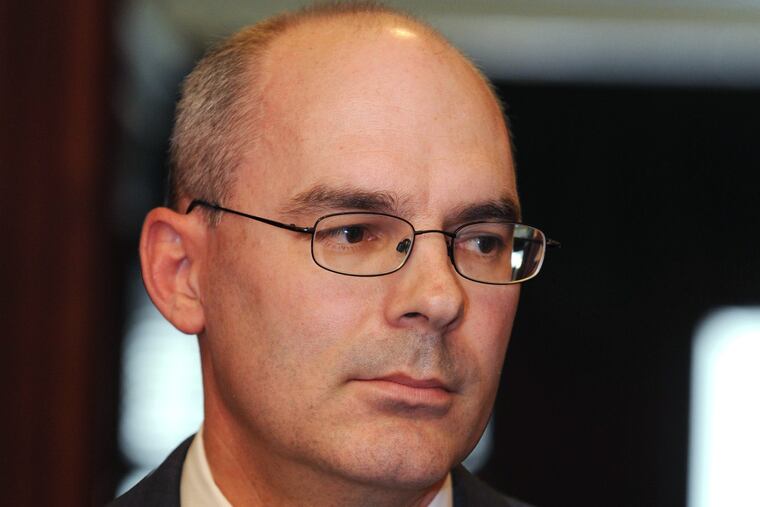Former prosecutor blasts ‘truthers’ over criticism of Penn State abuse probe
In the second day of testimony in an ethics case, former prosecutor Frank Fina says he properly called a university counsel as a witness against the former president of Penn State University and two of his ex-aides. A disciplinary counsel says Fina's move violated the defendants' attorney/client privileges.

Former state prosecutor Frank Fina, facing ethics charges over his aggressive pursuit of a former Pennsylvania State University president for covering up sex abuse there, on Friday blamed the case against him on a band of "truthers" who he said simply cannot accept the blow his sweeping investigation delivered to the university.
"They're vicious, frankly," Fina said as he took the stand in his defense at a hearing before a three-lawyer panel in Philadelphia weighing whether to suspend his law license.
Fina is fighting back in a civil case in which he is charged with unethically turning a top lawyer for Penn State into a witness against former university president Graham Spanier and two former senior administrators. The counsel for the state Disciplinary Board for lawyers says Fina violated the state's legal ethics code by putting Cynthia Baldwin, Penn State's former general counsel, on the stand to testify against Spanier.
Spanier; his former top lieutenant, Gary Schultz; and former athletic director Tim Curley were later convicted of failing to alert authorities of a sexual-abuse allegation made against Jerry Sandusky, the onetime Penn State assistant football coach now known as one of the nation's most notorious child molesters.
"These are people," Fina said, referring to his most severe critics, "who believe that Sandusky is innocent. They believe Spanier, Schultz, and Curley are innocent."
He noted that the Disciplinary Board, in notifying him he was under investigation two years ago, cited in part a complaint filed with the board against him by Wendy Silverwood, a Penn State alumna and a leading critic of the investigations of Spanier and his aides. Silverwood, who declined to comment Friday, has long maintained that Fina railroaded Spanier and his aides.
Amelia C. Kittredge, the Office of Disciplinary Counsel lawyer pursuing the civil case against Fina, told the panel that Fina's criticisms were off-base. "This is fiction," she said.
As a state prosecutor, Fina, now 52, led a series of high-profile investigations, winning more than two dozen convictions of elected officials and aides, both Republican and Democrat, in corruption probes. He played key roles in both the investigations of Sandusky — who was ultimately convicted of molesting 10 boys — and of Spanier and his associates.
After leaving his state post, though, Fina was targeted by the incoming attorney general, Kathleen Kane, who had campaigned as a critic of the Sandusky investigation and who blamed him for negative press. Her bungled attempt to leak harmful information about Fina led to her 2016 conviction on charges of misusing her authority. Sentenced to at least 10 months behind bars, Kane is free pending appeals. Fina, for his part, is in private practice.
In his last few years as a state prosecutor, Fina built the case against Spanier and the others, to some degree, by soliciting negative testimony against them from Baldwin. In bringing its cases against him, Kittredge has pointed to a 2016 state Superior Court ruling that threw out many of the most serious charges against the university officials. The appeals court said Fina should not have called Baldwin because she had previously represented the men in appearances before an investigative grand jury. Their right to have their talks with their attorney secret was violated, the court ruled.
In earlier testimony Friday, however, Baldwin told the panel that she had explicitly told the three men that she was representing the university — not them. She said she had given them what she called a "corporate Miranda warning," cautioning them not to expect her dealings with them to be confidential.
Fina made the same point in his testimony. "We felt very confident there was no personal attorney/client relationship," he said.
Moreover, Fina said, the men lost any claim to bar testimony from Baldwin once they lied to her. He and Baldwin both testified that the men misled her about their roles in covering up Sandusky's crimes, misleading her into thinking no daylight existed between their defense and the university's.